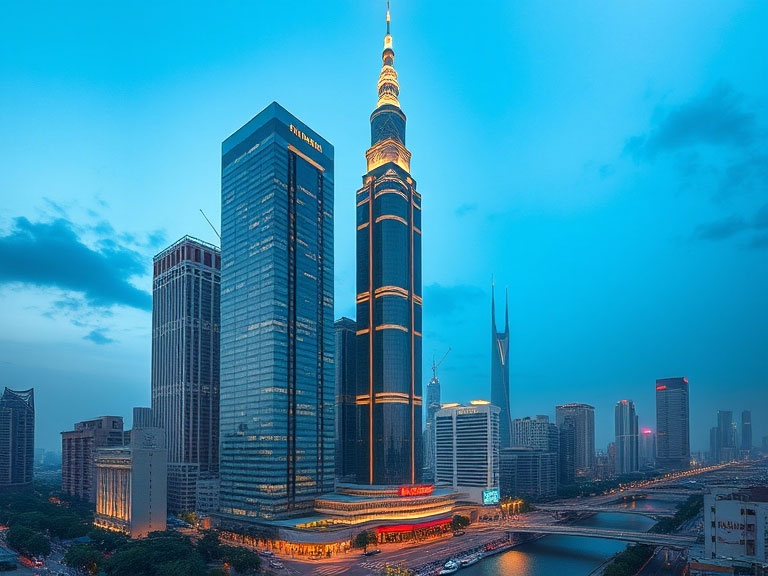To begin with, Vietnam is a dynamic and rapidly growing economy in Southeast Asia, making it an ideal destination for business travelers! Accordingly, proper planning is essential to make the most out of your business trip here. You should consider major logistics, such as obtaining a visa, choosing flights, and arranging accommodations in advance (especially if you’re traveling during peak tourist seasons). In fact, Vietnam has a range of visa options for business visitors, including the e-visa, which is available to citizens from 80 countries and allows stays of up to 30 days (Vietnam Travel - Visa Information). Furthermore, booking your stay close to business hubs like Hanoi or Ho Chi Minh City can save time, given the intense traffic in these urban areas. To be on the safe side, it is strongly recommended to find a local partner or travel agent to deal with all issues in a proffessional way. See Vietnam Business Directory at Bizpages for a list of trusted businesses.

Moreover, navigating Vietnam’s major cities can be challenging, as local transportation options vary significantly in quality and convenience. For example, Ho Chi Minh City and Hanoi have reliable taxi services and ride-hailing options like Grab, which can simplify your transit across business districts. In addition, it’s beneficial to learn some basic Vietnamese phrases (even if English is increasingly spoken in business settings). Indeed, showing a willingness to communicate in Vietnamese can build goodwill and rapport with local partners! Conversely, if you prefer private transfers, numerous services cater specifically to business travelers.
Finally, packing the right business attire and essentials is critical for a successful trip to Vietnam. In short, Vietnamese business culture places a high value on professionalism, so formal attire is typically expected for business meetings. However, be mindful of the tropical climate; you might want lighter fabrics to stay comfortable (especially if your business requires travel to multiple cities). Furthermore, keep in mind that punctuality is highly respected, so give yourself extra time to account for traffic delays. Thus, a well-prepared business wardrobe and mindset are key assets for any visitor in this vibrant country!
See more tips on business travel in Vietnam
What Cities are Vietnam's Top Business Hubs
In fact, Ho Chi Minh City is often considered Vietnam’s most important business hub, thanks to its booming economy and international connectivity. As the country's largest city, it contributes nearly 23% of Vietnam's GDP, which speaks volumes about its economic significance (VietnamNet - HCMC GDP Contribution). Consequently, you’ll find that many multinational companies have their Vietnam headquarters here, making it ideal for networking and business development! Additionally, the city’s infrastructure, including its new metro lines, is evolving rapidly to support growing business demands.
On the other hand, Hanoi, the capital city, is also a major business hub, especially for government relations and industries like banking, finance, and high-tech manufacturing. Indeed, Hanoi is home to the national government and has a large concentration of embassies and international organizations (making it advantageous for those with government or regulatory dealings). Equally, the city’s Thang Long Industrial Park attracts significant foreign investment, particularly from Japanese companies (Hanoi Times - Industrial Park). Despite its relatively slower pace compared to Ho Chi Minh City, Hanoi’s cultural and diplomatic importance offers unique advantages!
Meanwhile, Da Nang has emerged as a growing business center, particularly for tech startups and outsourcing companies. With a well-developed real estate sector, it offers multiple opportunities to stay at less budget. Truly, Da Nang's central location between Hanoi and Ho Chi Minh City is convenient for logistics, and its business-friendly environment has attracted many foreign investors. The city's infrastructure, including an international airport and high-quality internet services, further facilitates its role as a tech hub (Vietnam News - Da Nang Tech Growth). In addition, Da Nang’s scenic environment makes it an appealing option for businesses looking to balance work with lifestyle amenities, and you’re sure to enjoy its coastal views!
Learn more about Vietnam’s business cities
What Vietnamese Business Sectors are Most Attractive
Undoubtedly, manufacturing remains one of the most attractive sectors for investors in Vietnam, given the country’s cost-effective labor and strategic location within Southeast Asia. In fact, Vietnam is a global leader in electronics manufacturing, with companies like Samsung and LG having large-scale production facilities here (which speaks to the sector’s immense potential). As a result, foreign direct investment in manufacturing continues to grow, reaching nearly 20 миллиардов долларов США in recent years (see World Bank - Vietnam Economy). Accordingly, for any business involved in electronics, textiles, or machinery, Vietnam presents a lucrative market!

Besides manufacturing, Vietnam's information technology sector is flourishing and has become a priority for the government. Moreover, the country's digital economy is projected to reach 57 миллиардов долларов США by 2025, reflecting substantial growth potential (VN Express - Digital Economy Forecast). Subsequently, this growth is driven by an expanding middle class and high mobile penetration rates, which you’ll likely notice during your time here! Indeed, the government’s proactive approach to digitalization and e-commerce makes this a promising area for tech-savvy investors.
In addition, renewable energy is another sector drawing international interest as Vietnam shifts towards sustainable development. Currently, Vietnam is Southeast Asia's largest solar power producer, accounting for 44% of the region’s capacity (IRENA - Renewable Energy in Vietnam). In spite of the challenges in developing this sector, government incentives and increasing demand for clean energy create exciting opportunities for foreign investors. Certainly, for those interested in green energy, Vietnam’s progress and commitment to sustainability make it an appealing market!
(Explore more on Vietnam's key business sectors)
What are Business Fairs, Conferences, and Trade Shows to Visit in Vietnam in 2025
To begin with, one of the most anticipated business events in 2025 is the Vietnam Expo, which showcases a wide range of industries, including manufacturing, electronics, and IT. Indeed, this annual expo held in Hanoi attracts thousands of global participants and serves as a prime networking platform for business leaders (Vietnam Expo - Official Site). Consequently, if you’re looking to connect with top industry players and explore new market opportunities, this event is a must-attend! Additionally, the expo provides a unique insight into Vietnam’s evolving business landscape and emerging trends.
Additionally, the Vietnam International Trade Fair in Ho Chi Minh City offers an excellent opportunity for businesses in textiles, food, and technology to exhibit their products and services. Held every spring, this fair attracts exhibitors from over 20 countries and provides a platform to engage with both local and international partners (Vietnam Trade Fair - Official Site). For example, last year's event welcomed over 15,000 visitors, underscoring its importance in the region. Equally, if your business is looking to establish a footprint in Vietnam, this trade show could be highly beneficial.
Meanwhile, Vietnam's Solar Show is an essential event for those in the renewable energy sector, focusing on advancements in solar and clean energy. Moreover, this exhibition showcases cutting-edge technology and connects industry experts, offering you direct access to potential partners and government stakeholders (Solar Show Vietnam - Official Site). Likewise, the conference addresses Vietnam’s sustainable development goals, making it a compelling event for anyone interested in the green energy sector! Therefore, if renewable energy is your business focus, attending this event is a valuable opportunity.
Visit page for more on business events in Vietnam